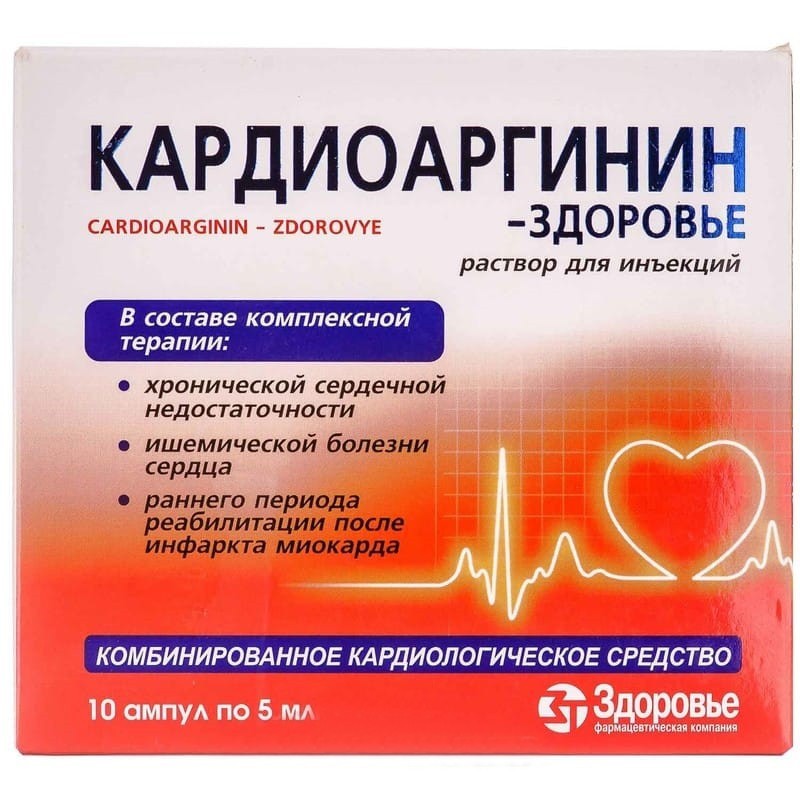



 Secure and encrypted payment processing
Secure and encrypted payment processing We ship to over 40 countries including the USA, UK, Europe, Australia and Japan
We ship to over 40 countries including the USA, UK, Europe, Australia and Japan Guaranteed refund or reship if you haven't received your order
Guaranteed refund or reship if you haven't received your orderCardio- and endothelium-protective metabolic agent with antihypertensive and adaptogenic properties. the drug reduces myocardial ischemia, improves coronary circulation, normalizes the functional state of the endothelium of the coronary and peripheral vessels, has antihypoxic, membrane-stabilizing, antioxidant and antiradical properties. when arg contributes to the normalization of hell and reduces the overall peripheral vascular resistance. the antihypertensive effect of the drug is realized due to the property of arginine (as a donor of nitric oxide) to enhance endothelium-dependent vasodilation, as well as the ability of this amino acid to regulate the level of ad and maintain the osmolality of body fluids and blood volume, including in the synthesis of the peptidergic hormone - vasopressin arginine. the metabolic cardioprotective effect of the drug is due to the ability of arginine, asparaginate and succinate to activate the energy supply processes of the heart muscle, restore energy potential in cells, normalize acid-base balance and intermediate metabolism, as well as protein metabolism in the myocardium, and stimulate the synthesis of amino acids, amino sugars and nucleotides. asparaginate is an intracellular carrier of ions of k + and mg2 +. thanks to potassium and magnesium, asparaginate eliminates electrolyte imbalance in the body, improves coronary circulation. Mg2 + ions activate na + / k + -phases; therefore, the intracellular concentration of na + ions decreases and the influx of ions to + increases in the cell. with a decrease in the concentration of na + ions inside the cell, the exchange of na + ions for Ca2 + ions in the smooth muscle of blood vessels is inhibited, which leads to their relaxation. K + ions stimulate the synthesis of ATP, glycogen, proteins, acetylcholine.
The drug exhibits an adaptogenic-actoprotective effect due to the substrate induction of cellular metabolism. Arginine, asparaginate and succinate activate the enzymatic processes of the Krebs cycle, stimulate the excretion of fatty acids and glucose by cells during exercise, have a positive effect on aerobic processes of energy supply of the cell, and reduce lactic acidosis.
In the complex treatment of chronic heart failure, coronary heart disease (stable angina pectoris caused by dysfunction or vascular spasm, painless myocardial ischemia), ar, atherosclerosis of the vessels of the heart and brain, diabetic angiopathy, hypercholesterolemia, early rehabilitation after myocardial infarction and other somatic diseases, endarteritis, cardiac arrhythmias caused by a deficiency of potassium and magnesium in the body (mainly with ventricular arrhythmias), including in the treatment of rdechnymi glycosides.
Syrup
It is used in adults inside.
For diseases of the cardiovascular system and during the rehabilitation period: 1-2 doses of syrup (7.5 ml) per day. The course of treatment is 10-20 days.
The maximum daily dose is 15 ml.
Perhaps the use in patients with diabetes.
The package contains a measuring cup.
Injection
The drug is prescribed to adults in / drip or stream.
Intravenous drip is administered 1-2 times a day, 5 ml per 100-200 ml of 5% solution of glucose or 0.9% solution of sodium chloride at a rate of 20-30 drops per minute.
Intravenously injected slowly (at a rate of not more than 5 ml / min), 5 ml 1-2 times a day.
The course of treatment is 5-10 days. The maximum daily dose is 10 ml.
After completing the iv administration of the drug, if necessary, switch to the oral administration of the drug in another dosage form - Cardioarginine-Health syrup.
Hypersensitivity to the components of the drug, hyperkalemia, av blockade of the i – ii degree.
From the digestive tract: rarely - a feeling of slight discomfort in the stomach and intestines, nausea, vomiting, diarrhea, stomach pain, ulceration and gastrointestinal bleeding, flatulence, dyspeptic symptoms, thirst immediately after use of the drug, which disappear on their own;
from the cardiovascular system: decreased blood pressure, impaired intraventricular conduction;
on the part of the nervous system: muscle weakness, hyporeflexia, disorientation, dizziness, paresthesias, sensation of heat, hyperemia of the face, respiratory depression, cramps, increased sweating;
on the part of the skin: allergic reactions (itching) are possible;
others: myasthenia gravis, asthenia, phlebitis, venous thrombosis, dyspnea.
With rapid on / in the introduction - hyperkalemia, hypermagnesemia, muscle hypotension, paresthesia of the extremities, slowing of AV conduction, arrhythmia, cardiac arrest.
Use during pregnancy and lactation. the safety of the drug during pregnancy and lactation has not been established.
During the treatment period, breast-feeding should be discontinued.
Children. The effectiveness and safety of the drug in childhood have not been established.
The ability to influence the reaction rate when driving vehicles or working with other mechanisms. Does not affect.
When using arginine aspartate, it must be borne in mind that the combined use of aminophylline with arginine may be accompanied by an increase in blood insulin; spironolactone with arginine - an increase in the level of potassium in the blood.
The drug improves the tolerance of cardiac glycosides, enhances the effect of drugs that stimulate trophic processes in the myocardium; prevents the development of hypokalemia due to the use of saluretics, corticosteroids, cardiac glycosides. With simultaneous use with potassium-sparing diuretics and ACE inhibitors, the risk of developing hyperkalemia increases (the level of potassium in the blood plasma should be monitored). The drug reduces sensitivity to cardiac glycosides.
Symptoms: hypotension; hyperkalemia and hypermagnesemia: pain in the stomach, metallic taste in the mouth, muscle weakness, paresthesia, muscle stiffness, an increase in the amplitude of the t wave, a decrease in the amplitude of the tooth r, an expansion of the qrs complex are recorded on the ecg.
Treatment: symptomatic therapy aimed at maintaining vital functions, parenteral administration of calcium preparations.
Store in the original packaging at a temperature not exceeding 25 ° c